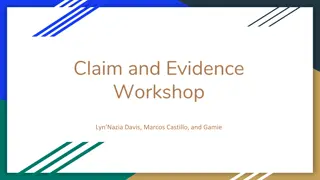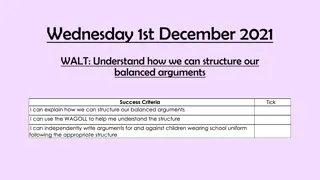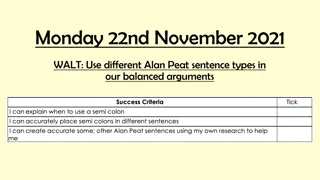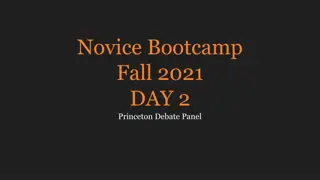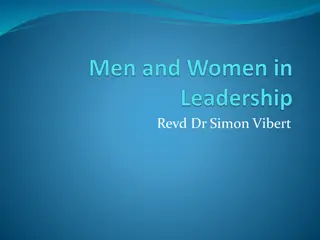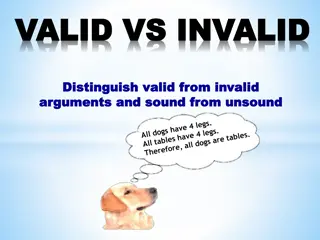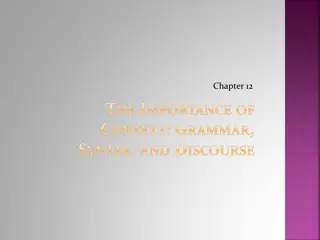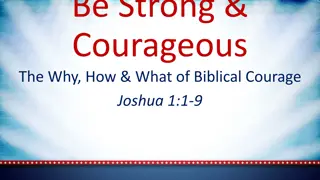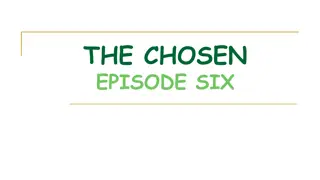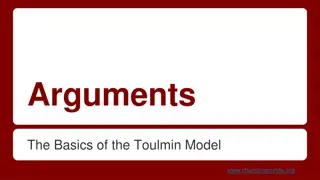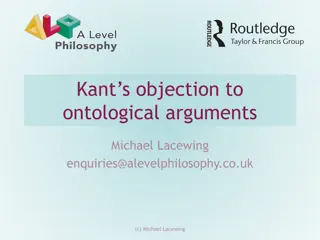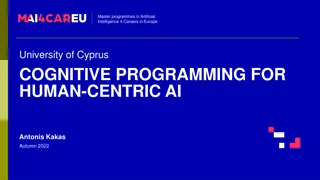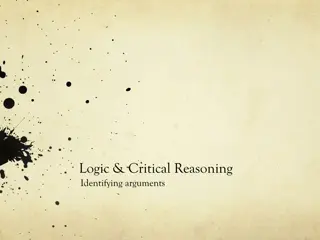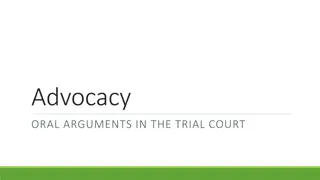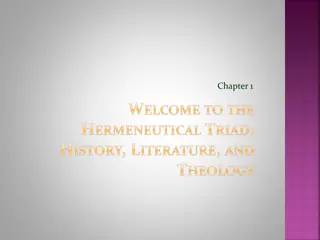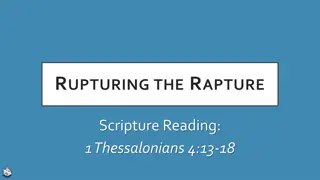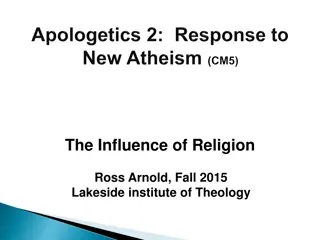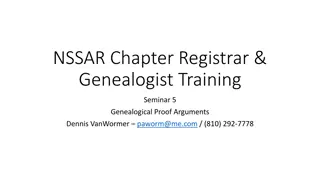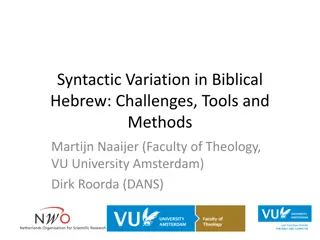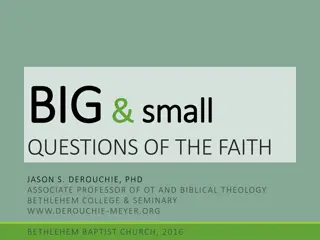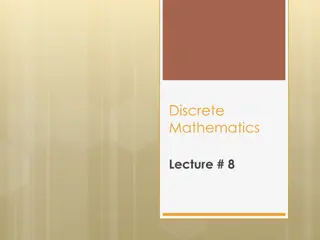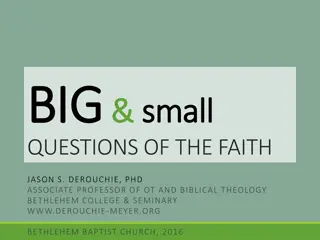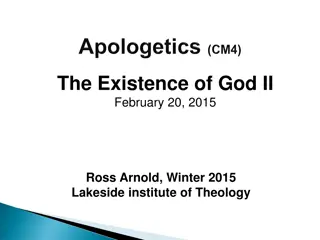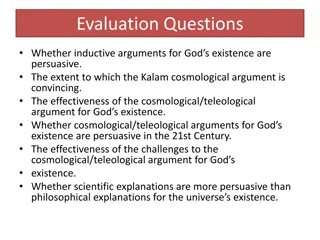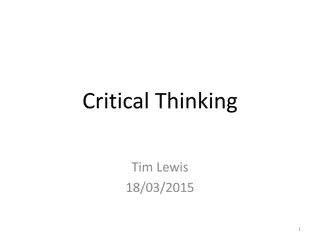Mastering the Toulmin Method for Constructing Persuasive Arguments
Learn how to effectively structure arguments using the Toulmin Method, which consists of Claim, Data, Warrant, Backing, Counterclaim, and Rebuttal elements. Explore reasoning and logic concepts, differentiate between inductive and deductive reasoning, and understand how to construct valid arguments
0 views • 30 slides
Understanding the Structure of Balanced Arguments
Explore the concept of using the third person in writing balanced arguments to maintain objectivity and structure. Learn about third person pronouns and the importance of being unbiased in your writing. Understand the significance of structuring your arguments and maintaining a clear order for effec
0 views • 11 slides
Mastering Alan Peat's Balanced Arguments with Different Sentence Types
Explore the use of various Alan Peat sentence types in crafting balanced arguments, focusing on incorporating semi-colons effectively. Engage in interactive activities and practice sessions to enhance your skills in creating compelling arguments. Dive into examples and exercises to refine your under
1 views • 12 slides
Mastering Debate: Essential Strategies and Techniques
Learn key concepts like argument structure, points of clarification, and how to make compelling arguments in a debate setting. Discover the importance of warrants, impacts, and implications in formulating strong arguments. Explore tips on coming up with effective arguments and understanding differen
0 views • 47 slides
Mastering Final Focus in Debates
Final Focus, a crucial 2-minute speech at the end of a debate, serves as your last chance to persuade the judge of your victory. It involves comparing key voters and emphasizing the impact of your arguments. Weighing key voters is essential, with a focus on demonstrating why the scale tips in your f
1 views • 4 slides
Examination of Biblical Perspectives on Gender Roles in Ministry
This content delves into the debate between egalitarian and complementarian views on gender roles in ministry within Christianity. It explores biblical passages such as 1 Timothy 2:11-15, 1 Corinthians 11 and 14, highlighting arguments regarding women's involvement in teaching, prophesying, and lead
0 views • 16 slides
Understanding Reasonable Arguments vs. Pseudo-Arguments
The provided content focuses on distinguishing between reasonable arguments and pseudo-arguments through thought-provoking questions such as the ethical treatment of animals, city subsidies for sports venues, and subjective opinions on aesthetics. It also explains the structure of an argument, highl
0 views • 18 slides
Understanding Joy and Happiness: Insights from Biblical Perspectives
Exploring the concepts of joy and happiness from a biblical standpoint, this content delves into the distinction between external circumstances that bring happiness and the inner joy derived from a deeper spiritual connection. The discussion draws upon verses from the Old and New Testaments to illum
2 views • 23 slides
Understanding Valid and Invalid Arguments in Logic
In logic, arguments consist of premises supporting a conclusion, with deductive arguments claiming logical necessity. Valid arguments have premises implying the conclusion, making them deductively valid. For example, if all actors are robots and Tom Cruise is an actor, then logically Tom Cruise must
0 views • 25 slides
The Biblical Concept of Modesty in Dress: Unveiling the Truth
Exploring the Biblical perspective on modesty in dress, this content delves into the origins of immodesty, the importance of modest apparel according to 1 Timothy 2:9-10, and the concept of decency and immodesty as seen through the story of Adam and Eve in Genesis 3. It emphasizes the need for a dee
2 views • 28 slides
Understanding Grammar, Syntax, and Discourse in Biblical Texts
Explore the significance of context in analyzing grammar, syntax, and discourse in biblical Greek and Hebrew texts. Learn about the foundational elements, word order, Greek syntax basics, and the importance of discourse analysis. Delve into the definitions of grammar, syntax, and discourse, and unde
1 views • 30 slides
An Examination of Ontological Arguments for God's Necessary Existence
Various ontological arguments, such as Malcolm's and Anselm's, propose that the existence of God is logically necessary, grounded in the concept of God as the greatest possible being. These arguments challenge the coherence of the concept of God and counter objections, like Kant's claim that existen
2 views • 10 slides
Embracing Biblical Courage: The Call to Be Strong and Courageous
In the narrative of Joshua 1:1-9, the essence of biblical courage unfolds, emphasizing the why, how, and what of embracing strength and bravery. Courage is essential as individuals face challenges to conquer giants for God's glory, amidst opposition and temptations. Drawing parallels from biblical s
0 views • 26 slides
Exploring Biblical Stories: Episode Six, Opening Prayer, and The Sin Cycle
Dive into the profound teachings and stories within biblical texts, including Episode Six of The Chosen series, the powerful Opening Prayer from Luke 5:12-16 and Psalm 103, and reflections on The Sin Cycle. Meet the Biblical characters such as Salome, the mother of James and John, wife of Zebedee, a
0 views • 15 slides
Understanding the Toulmin Model for Effective Argumentation
The Toulmin Model provides a structured approach to crafting and evaluating arguments, consisting of key components like claims, grounds/data, and warrants. It emphasizes the importance of using evidence and reasoning to support claims effectively. By understanding this model, one can enhance the pe
0 views • 13 slides
Kant's Critique of Ontological Arguments
An exploration of Kant's objection to ontological arguments, examining the flaws in the reasoning of Anselm and Descartes. Kant argues that existence is not a predicate and does not enhance the concept of a being. Therefore, ontological arguments cannot prove the existence of God solely through conc
0 views • 7 slides
Understanding Argumentation and Realization in AI Master Programmes
Exploring the concept of argumentation and its realization in artificial intelligence master programmes, focusing on the construction, evaluation, and implementation of arguments through cognitive programming. The framework involves structured argumentation, conflict relations, and strength/preferen
1 views • 31 slides
Understanding Logic and Critical Reasoning: Identifying Arguments
In the study of logic and critical reasoning, identifying arguments is a fundamental task. Arguments consist of premises supporting a conclusion, and they can be identified by specific indicators and techniques. Understanding argument structure and types of support, such as deductive and inductive,
2 views • 15 slides
Exploring Biblical Justice and Narratives
Delve into the concept of Biblical justice, grounded in God's character and narrative, through key passages and narratives from Genesis and Exodus. Understand the themes of order, harmony, and redemption as portrayed in the Biblical context.
0 views • 44 slides
Guide to Oral Arguments in Trial Court
Learn how to conduct oral arguments in a trial court, including the steps for both the movant and respondent, strategies for making strong arguments, and tips for responding effectively. This comprehensive guide covers the dos and don'ts of oral arguments, emphasizing the importance of preparation,
0 views • 9 slides
Supporters of Slavery in the 19th Century: Legal, Religious, and Economic Arguments
In the 19th century, defenders of slavery utilized legal arguments by denying citizenship rights to blacks, religious arguments by justifying ownership and guidance through biblical references, and economic arguments by comparing treatment of slaves in the South to conditions of workers in the North
0 views • 4 slides
Understanding Command-line Arguments and Errors
Learn how to utilize command-line arguments in Python scripts to enhance flexibility and parametrize functions for various inputs. Explore ways to access and utilize command-line arguments effectively, while handling errors gracefully.
0 views • 30 slides
Exploring Biblical Interpretation: History, Literature, and Theology
Delve into the importance of skilled biblical interpretation, the cost of failed interpretation, and the essential characteristics of a biblical interpreter. Understand the significance of humility, the role of the Spirit, and the need for accuracy in handling the Word of God. Learn about the hermen
0 views • 23 slides
Understanding the Rapture and the Kingdom of Christ in Biblical Perspectives
Exploring the concept of Rapture and the Kingdom of Christ through scriptural readings in 1 Thessalonians and other biblical texts. Discusses the events surrounding the Rapture, the nature of the Kingdom of Christ, and addresses common misconceptions regarding these biblical teachings.
0 views • 11 slides
Embracing Biblical Principles for Positive Impact in Society
Explore the significance of building the Kingdom of Christianity, discussing biblical references on societal problems, emphasizing truth in culture, and celebrating unexpected victories. Encouragement to be bold in upholding truth and engaging actively in societal issues while drawing inspiration fr
0 views • 22 slides
Exploring the Clash Between New Atheism and Biblical Morality
The clash between New Atheists and biblical morality is highlighted in their differing views on ethics, justice, and religious teachings. Christopher Hitchens and Richard Dawkins express skepticism towards biblical moral codes, while advocating for a secular set of ethical principles. The debate enc
0 views • 10 slides
Exploring the Diversities of Tongues in Biblical Context
Delve into the biblical concept of Diversities of Tongues, a supernatural ability to speak in various languages, with examples from the Old and New Testaments. Discover how this gift operates, its significance in the Early Church, and its manifestation among believers. Learn about the initiation and
0 views • 40 slides
Analyzing Arguments in English Debates: A Critical Approach
Explore and critique various arguments presented in English debates, including topics like dietary recommendations, digestion issues with Japanese rice, and driving skills in different weather conditions. Learn how to evaluate evidence, causality, and persuasiveness in arguments to develop critical
0 views • 19 slides
Mastering Academic Writing Moves: The Art of Summarizing
In academic writing, mastering the art of summarizing is crucial for persuasive arguments. By engaging in dialogue with others and summarizing their arguments, writers can strengthen their position. It is important to strike a balance between the original author's ideas and your own, emphasizing asp
0 views • 15 slides
Understanding B.C.V. Religion: A Biblical Perspective on Faith and Practice
Explore the concept of B.C.V. Religion through the lens of Biblical teachings, emphasizing the importance of adhering to Scripture and living a life that glorifies God. Delve into the origins of the Restoration Period and its impact on modern faith practices, focusing on key figures and their emphas
0 views • 26 slides
Quiz Time - Test Your Knowledge with Biblical Trivia Questions
Engage in a fun quiz session with questions related to biblical stories and characters. Test your knowledge about animals, miracles, locations, and objects from various biblical events. Answer questions about Jesus, Noah's Ark, dining scenes, bedtime stories, and musical instruments depicted in the
0 views • 24 slides
An Overview of Debate: Propositions, Teams, and Formats
Debate is a regulated discussion between two matched sides discussing a proposition, with the affirmative arguing for change and the negative defending the status quo. The standard debate format involves constructive arguments followed by rebuttals from both sides. The roles in a debate include the
0 views • 47 slides
Genealogical Proof Arguments and SAR Standard of Proof
This detailed content covers the definitions and components of genealogical proof arguments, proof summaries, and the SAR standard of proof. It explains the importance of evidence quality, source citations, and analysis in establishing acceptable genealogical conclusions for SAR membership applicati
0 views • 22 slides
Challenges of Syntactic Variation in Biblical Hebrew
Linguistic variation in Biblical Hebrew has sparked a heated debate since 2000, challenging traditional dating methods and assumptions. The Structure Debate delves into syntactic variation and the use of the participle, while considering the differing language in Early Biblical Hebrew (EBH) and Late
0 views • 21 slides
Understanding Young Earth Creationism: Biblical Perspectives on the Age of the Earth
Exploring the viewpoint of Young Earth Creationism (YEC) based on biblical arguments, this content delves into the belief that God created the earth in six 24-hour periods, making it exceptionally young by conventional scientific standards. The discussion focuses on the biblical passages and theolog
0 views • 20 slides
Understanding Valid and Invalid Arguments in Discrete Mathematics
Concepts of valid and invalid arguments in discrete mathematics are explored through examples. Learn how to determine the validity of arguments based on premises and conclusions. Practice using truth tables to evaluate argument forms. Enhance your logical reasoning skills in Discrete Mathematics.
0 views • 22 slides
Exploring Young Earth Creationism and Biblical Arguments
Delve into the intricate beliefs of Young Earth Creationism (YEC) as it posits a literal interpretation of the Genesis creation account. Understand the challenges and justifications behind the idea that God created an Earth of immense youth within a short timeframe. Explore biblical passages that su
0 views • 20 slides
Philosophical Apologetics: Arguments for the Existence of God
Philosophical apologetics presents various arguments for the existence of God, including the ontological, cosmological, teleological, moral, transcendental, and presuppositional arguments. These arguments cover diverse aspects such as change, causality, design, contingency, miracles, consciousness,
0 views • 10 slides
Evaluating Arguments for God's Existence in the 21st Century
Exploring the persuasiveness of inductive arguments for God's existence, assessing the Kalam cosmological argument, and evaluating the effectiveness of cosmological/teleological arguments. Delving into whether scientific explanations surpass philosophical ones, the strengths and weaknesses of these
0 views • 16 slides
Understanding Critical Thinking, Hypotheses, and Arguments
Explore the concepts of critical thinking, hypotheses, and arguments in this informative content. Learn about the definition of hypotheses, the nature of arguments, and syllogisms. Delve into the world of logical reasoning and the foundations of thought processes.
0 views • 32 slides
